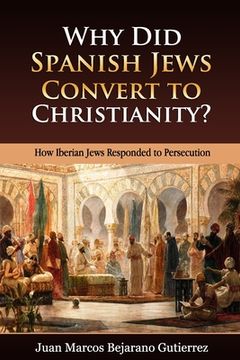Why Did Spanish Jews Convert to Christianity?: How Iberian Jews Responded to Persecution (en Inglés)
Reseña del libro "Why Did Spanish Jews Convert to Christianity?: How Iberian Jews Responded to Persecution (en Inglés)"
The mass conversion of Iberian Jews to Christianity in the late 14th and 15th centuries was catastrophic for the Jewish community. Possibly up to a third of the Jewish community converted. There are many reasons why such large-scale conversions occurred. The widespread violence which spread across Castile and Aragon was unprecedented. Violence was the immediate cause for the mass conversions, and the debilitated state of Jewish communities following these attacks was also a factor in subsequent waves of conversion. The crisis, however, is also seen as the consequence of an absence of spiritual unity within the Spanish Jewish community. A widespread view is that a rupture developed between ordinary Jews and the wealthy learned Jews serving in royal court positions. The latter are described as unconcerned with Jewish law. According to this reasoning, some of these individuals were influenced by rationalist philosophy popular within Arabic culture. A class of Jewish courtiers had developed in the scholarly atmosphere of Andalusia under Islamic rule during the tenth and eleventh centuries. When the intellectual heirs of this tradition eventually fell under Christian rule, they progressively quarreled with established Jewish leaders. The latter were ill deposed towards their philosophical tendencies. There were growing circles of mystics known as Kabbalists, whose obscure readings of Jewish texts were, in part, a reaction to the philosophical leanings of those Jews serving the royal court. The scholar Kevin Ingram has argued that these differing scholarly and mystical tendencies within the Jewish elite unsurprisingly shaped a measure of diffidence in Jewish communities which was eventually exploited by the Franciscan and Dominican monks. These mendicant orders initiated vigorous evangelizing activities during the fourteenth century and continued to do so immediately after the catastrophe of 1391. Despite this assault, the majority of those who relented to the pressure of conversion believed that they were not genuinely committing apostasy if, after their formal initiation into Christianity, they sustained their commitment to Jewish faith clandestinely. The goal, of course, was to eventually return openly to Judaism at the first possible occasion, something which did not occur for many. Many Jews were merely pragmatists about the situation they faced. Here Kevin Ingram argues, pragmatism was something that they had absorbed from their leadership. While the riots in Spain reached an unprecedented level regarding the number of communities affected and the number of Jews targeted, similar attacks occurred in central Europe centuries before. The reactions of the Jewish community in the Rhineland in the 11th century to persecution have been compared to the reactions of the Iberian Jewish community, often critically connoting the differences in religious fidelity between the two groups. In short, the Jewish settlements of the Rhineland are depicted as much more committed to the Jewish faith because of their supposed willingness to die as martyrs in comparison to their Spanish counterparts. The accounts of the initial riots in 1391 show that many Spanish Jews did die as martyrs, but the overwhelming majority of Spanish and Portuguese Jews would not. The realities regarding the idealized picture of unflagging martyrdom among the German communities of the Rhineland are much more complicated, however. They often reveal similarities to the circumstances and decisions their Iberian counterparts would face and make centuries later. This volume is, in many ways, a continuation of two previous works. The first is Secret Jews: The Complex Identity of Crypto-Jews and Crypto-Judaism and the second The Rise of the Inquisition: An Introduction to the Spanish and Portuguese Inquisitions.

